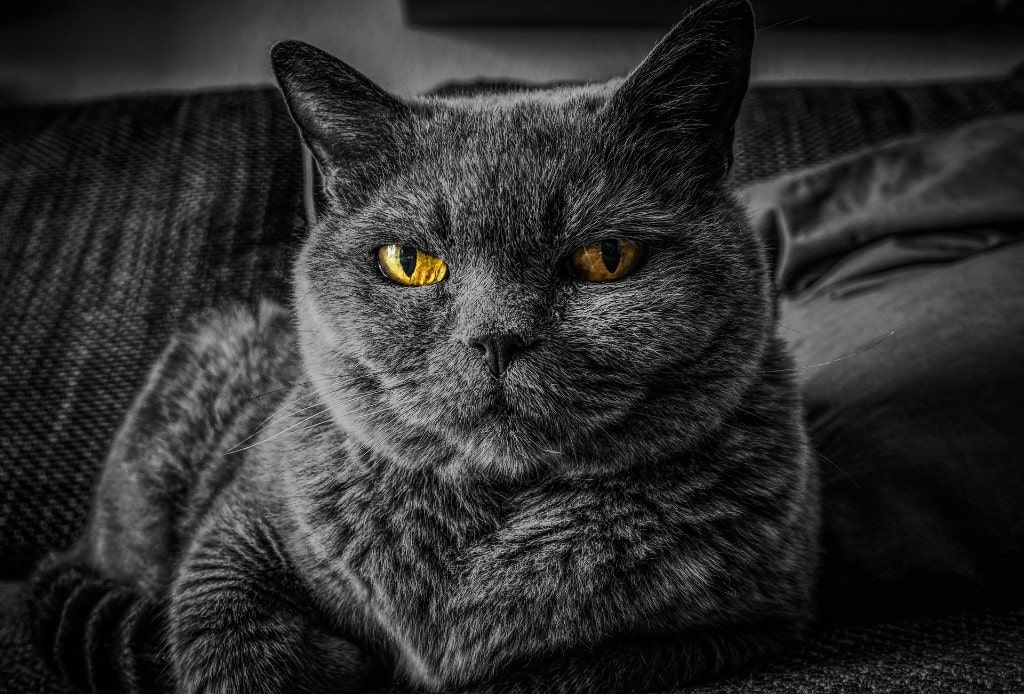Your Cat Is Breathing Fast? Probable Reasons And Warning Signs

For you to know when your cat is breathing fast it’s helpful to recognise the normal cat breathing rate. A healthy cat will take between 20 and 30 breaths per minute. And this is known as cat respiratory rate.
You can take your cat’s heart rate by feeling over the left side, just behind the front leg. Use a stopwatch or your Smartphone to time the number of beats in 15 seconds. Then times by 4 to get the beats per minute. A normal heart rate is between 140 and 220 beats per minute.
To take the respiratory rate count the number of chest movements in 60 seconds, or do 15 seconds and multiply by four as before. A relaxed cat will measure on the lower end of the scale.
Rapid breathing in cats indicates that your cat is unable to get enough oxygen into the lungs. The breath rate increases and may become shallow. This can become serious and sometimes fatal. Your cat is breathing fast? Probable reasons and warning signs are listed here…
Breathing Patterns
A cat breathing fast with rapid and shallow actions could be related to serious medical conditions. The key signs to look for are:
- Quick, shallow breaths
- Wheezing
- Coughing
- Loss of appetite
- Blue gums
- Lack of energy
- Cat breathing fast when sleeping
Dyspnea
When your cat’s breathing fast and not eating this is a possible sign of dyspnea. This is respiratory distress that may result in your cat to panting. Difficulty in breathing may cause:
- Nostrils to flare
- Open mouth
- Cat noisy breathing
- Extended neck and head held low
- Abdomen and chest movements
Panting
Cats will pant in extreme circumstances and you need to look for:
- Cat fast breathing
- Shallow breaths
- An open mouth
Reasons for Rapid Breathing
My cat is breathing fast is a common statement. And there’s a range of potential causes including:
- Allergic reaction
- Asthma
- Foreign objects
- Heartworm
- Injury
- Pain
- Pneumonia
- Pulmonary oedema
- Respiratory infections
- Shock or stress
- Trauma
- Tumours in throat or chest

Determining the Cause
Remember that purring can indicate distress as well as happiness. Your cat breathing fast and purring could mean asthma or cardiac disease. Your vet will need to know a thorough history and if your cat is breathing fast but otherwise normal.
It’s important that you inform your vet whether your cat is allowed outdoors. This could help diagnose trauma, injury due to a fall or fight, and other causes of pain. And try to provide times when symptoms started and when they seemed better or worse.
Extensive tests will be conducted. These include:
Observation of your cat’s breathing – listening to the chest for evidence of a heart murmur
Evaluation of your cat’s gum colour – indicating anaemia and lack of oxygen to organs
Blood work – this will identify any infections present and evaluate the amounts of carbon dioxide and oxygen in the blood
Blood tests – to eliminate the parasitic heartworm infection
Urinalysis – to determine infection of the kidneys or bladder
X-rays– to pinpoint fluid build-up foreign objects or potential tumours
Ultrasounds – to examine for an enlarged heart and abnormal lungs
ECG – to measure the electrical activity and rhythm of the heart
Endoscopy – where samples of fluid and cells may be taken for further analysis
Treatments
If no broken bones show up on images your cat may be allowed home. You’ll be given pain medication to give to your cat. And will need to find a warm and safe place for your cat to recover. During this time you must restrict activity, and keep your cat confined in a cage if necessary.
Allergies will be treated with medication such as antihistamines. And this may need to be ongoing during certain seasons when the risk of reaction is higher. Your cat may be on medication for the rest of its life.
Strong antibiotics will be prescribed to treat rapid breathing when caused by fluid filling the lungs. And infections or pneumonia. You cat may need to stay in the animal hospital so that 24/7 care can be provided. Trained staff will administer oxygen and give intravenous fluids.
Congestive heart failure is a life-threatening disorder. And occurs when the heart doesn’t pump blood effectively. This causes fluid to back up in the lungs and abdomen. Sometimes the heart does recover. But most cases are irreversible and treatment with oxygen therapy, diuretics, and vasodilators will only manage to slow down the process.
Putting Your Cat to Sleep
Sometimes there may be no alternative than to let your feline friend go. Gentle cat euthanasia at home in calm surroundings is an option you may wish to consider. Your home visit vet will carefully explain the procedure. And with pre-sedation letting your cat drift into a peaceful sleep, this may be the best decision you can make for your cat. And for you.
Tags: cat ageing, Pet CareCloud 9
To ensure accuracy, a professional vet has reviewed and verified the information presented in this article. It is important to note that when it comes to making decisions about euthanasia for your pet, there are no easy answers. It is always recommended to seek advice from your own veterinarian before making any decision.



